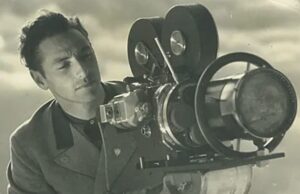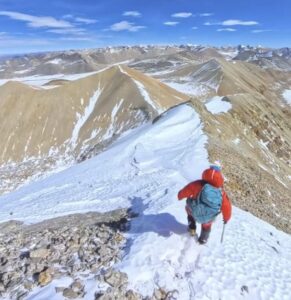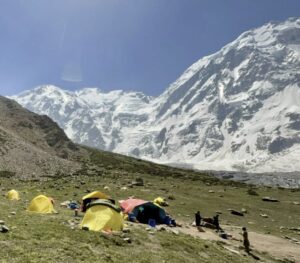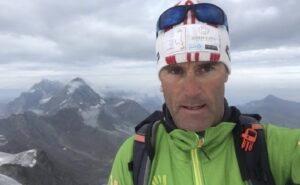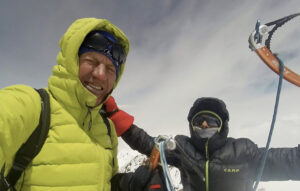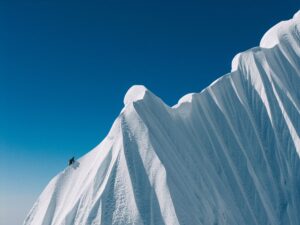Flying somewhat under the radar, Sirbaz Khan has climbed step by step toward the summit of mountaineering in Pakistan. He has worked hard for every metre. Lacking big sponsors, he works with the Nepali rope-fixing teams, especially with Mingma G’s Imagine Nepal. With them, he summited Annapurna and Dhaulagiri last year. This spring, that same strategy and effort have taken him to Camp 4 on Kangchenjunga.
As this story posts, Sirbaz is helping fix ropes above Camp 4. He then returns to that high camp for a brief rest, then sets off for the top of Kangchenjunga. The tentative summit day is April 27. You can check his tracker here.
Before leaving, he and partner Saad Munawar shared some thoughts from Base Camp with ExplorersWeb. His is a remarkable story of learning and determination. He also offers a rare perspective on the Himalayan scene from a different culture.

Sirbaz Khan in Base Camp.
Starting from the bottom
Like many climbers in Pakistan, Sirbaz Khan — born in Hunza, in Gilgit-Baltistan — began his career as a low-altitude porter in 2004. For a decade, he worked as a porter and kitchen help on various expeditions. He also watched and asked as many questions as he could of such foreign expedition leaders as Ralf Dujmovits, Gerlinde Kaltenbrunner, and Joao Garcia.
“He wanted to climb higher but did not get an opportunity until he met Mingma G,” Saad Munawar told ExplorersWeb. “It was Mingma who asked Sirbaz to join his future teams as a high-altitude climber and porter.”
Khan climbed his first 8,000er with Mingma G. In Pakistan, in the off-season, they summited Nanga Parbat on October 2, 2017. Check the video below.
Khan discovered that his body performed very well at high altitude. “Right then, he planned to do the 14×8,000’ers,” Munawar said. “He saw that most people going for the 14 biggest peaks did not have even one of them in their home country. He felt that someone from Pakistan should achieve the feat since Pakistan has five of them.”
The “Hunza Sherpa”
Sirbaz climbs with big international groups, not as a typical client, but paying his way by working with the rope-fixing teams. This has given him a unique view of expeditions from both the Nepali and Western perspectives.
“There aren’t many opportunities in Pakistan to learn high-altitude climbing,” Khan admitted. “I take it as a learning opportunity to work with the Sherpas. One thing that I have always liked about the Sherpas is their dedication and honesty. And when I work shoulder to shoulder with them, I earn their respect and I take pride in that.”

Khan with one of Imagine Nepal’s leading Sherpa climbers. Photo: Sirbaz Khan
Khan considers himself a representative of his country and behaves accordingly. “If I do good work, it’ll bring a good name to my country and my community,” he says.
Mountaineering in Pakistan

Khan atop his most recent 8,000m summit, Dhaulagiri, in fall 2021. Photo: Dawn
Khan has witnessed an increasing number of Nepali climbers becoming successful company owners, while others gain fame as climbers. Asked if there is a similar track in Pakistan, his answer is a “yes, but”.
“Pakistan has seen a rise in interest in mountaineering and adventure tourism but there is still a lot of work to do,” he says. “In fact, blind interest without a basic education in this field can be dangerous. Nepal has a much better infrastructure in adventure tourism. That is why the fame of their climbers can directly convert into business [opportunity].”
“Nepal has many certified guides (we have none so far), a better insurance system, training schools, and good rescue systems. We can turn the work of our top climbers [into broader success] only if we build a solid foundation first. Then yes, the increasing interest will help promote mountaineering in Pakistan.”

Rope fixing in uncertain weather. Photo: Sirbaz Khan
Currently, Sirbaz Khan has to confront the challenge of Kangchenjunga, a mountain that has already tested him to his limits, he admitted recently.
Back in Base Camp, Saad Munawar said: “Sirbaz gives Kangchenjunga the respect that it deserves and rates it among the most difficult mountains, alongside K2, Nanga Parbat, and Annapurna.”

Sirbaz Khan, right, with friend, PR manager, and climber Saad Munawar. Both wear Pakistan’s national colors. Photo: Sirbaz Khan
Munawar confirmed that Khan intends to climb all the way to the summit without supplementary oxygen. Khan, he says, wants to “give his best in every way to make sure that his performance is deserving of a summit.”

Sirbaz Khan’s tracker located him at 7,340m on the evening of April 25.

